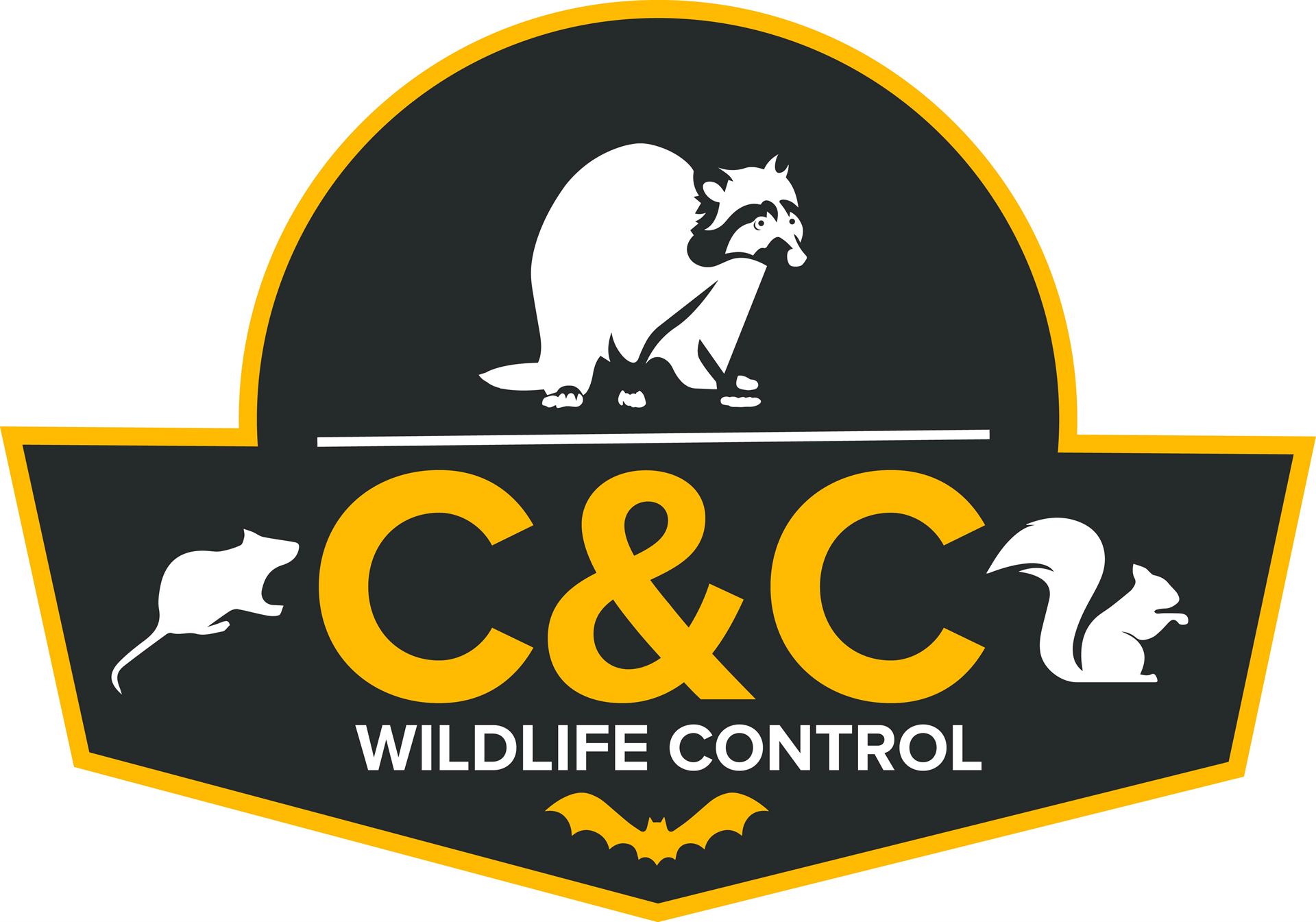Skunk Removal
Skunks are well-known for their awful stench, and that alone is a great reason to remove them. Yet there’s more to their spray than just the smell, as it can take three weeks for it to lose its scent.
Skunk Removal
Known virtually everywhere, the signature black and white fur of a skunk brings to mind the powerful odor they are capable of producing. While they might seem harmless other than their stench, skunks actually have the ability to cause a variety of different damages and problems for homeowners and their families. Continue reading to learn more.
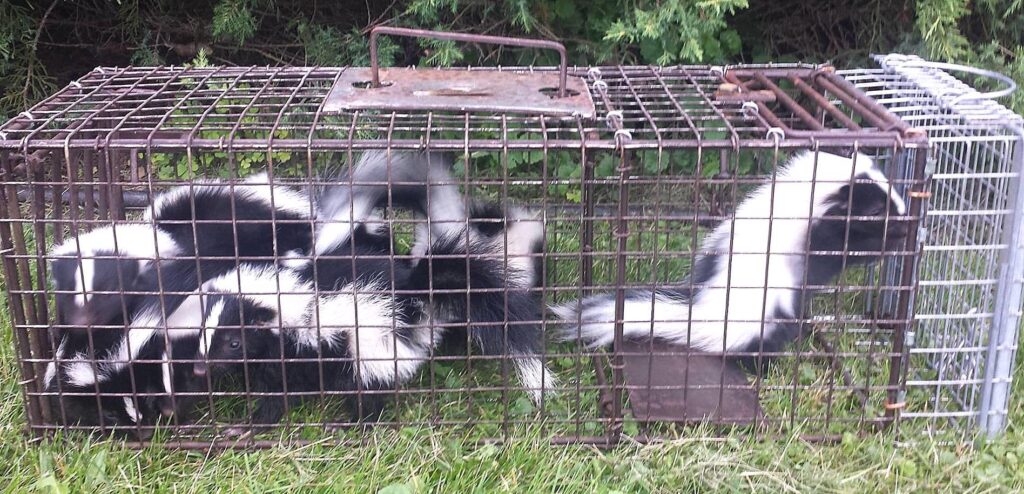
What damage do skunks cause?
Skunks are well-known for their ability to tear up gardens of both vegetables and flowers, as they root around to find grubs for their meals. In addition, skunks often dig fairly large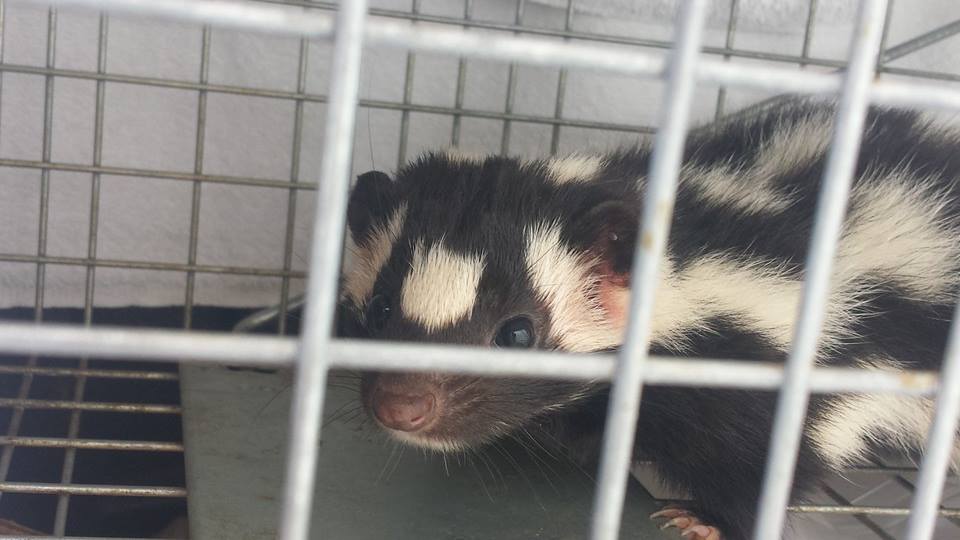 dens that can even cause structural damage to homes and other buildings. However, the most serious problem with skunks is their disease-carrying capabilities. Obviously, no one wants to get sprayed by a skunk, but that is the least of your worries with skunks. They commonly carry rabies, leptospirosis, tularemia, and many other nasty diseases that can be potentially fatal to humans. These are just a few of the most important reasons to get rid of skunks as soon as possible.
dens that can even cause structural damage to homes and other buildings. However, the most serious problem with skunks is their disease-carrying capabilities. Obviously, no one wants to get sprayed by a skunk, but that is the least of your worries with skunks. They commonly carry rabies, leptospirosis, tularemia, and many other nasty diseases that can be potentially fatal to humans. These are just a few of the most important reasons to get rid of skunks as soon as possible.
How can I prevent skunks?
If you want to prevent skunks, your best bet is by cleaning up your yard and disposing of any easy food sources. Clean up any of the fruit that has fallen from fruit trees. Make sure your trash and pet food are secured so that no animal has access to them. Clean up any piles of stones, sticks, or other debris, as these can be breeding grounds for common prey of skunks. In addition, you also have the option to put up a fence that bars access for skunks.
How can I get rid of skunks?
It might sound simple enough to remove skunks from your property. Simply put bait in a cage trap and release the skunks into the wild, right? Actually, it is not quite that simple. Skunks are very cautious creatures, and if anyone happens to get too close, they will spray without hesitation. In addition, it can be hard to get many skunks to enter cage traps, and this generally leads to professional wildlife removal experts being hired.
Why hire C&C Wildlife Control?
Here at C&C Wildlife Control, we have years and years of experience in dealing with pests of all kinds, skunks included. We love serving Hartford County and Tolland County in Connecticut. While they might not be a fun animal to be around, we treat every nuisance skunk with humane treatment, and we always strive to perform at peak effectiveness for our clients. In addition to wildlife removal services, we also offer wildlife exclusion services, attic restoration services, sanitation services, and animal damage repair services. If you have a problem with any type of nuisance wildlife, give C&C Wildlife Control a call, as we would be happy to help you out!
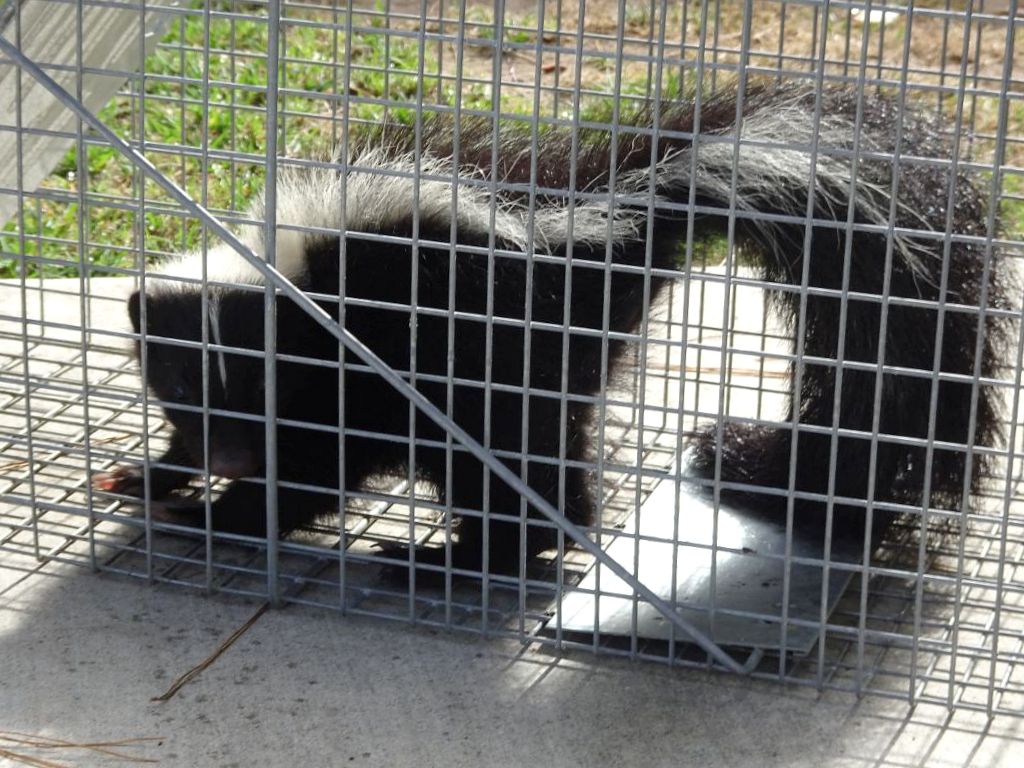
Why Are Skunks Attracted to My Property
Do you always see skunks wandering your property, especially at night? Then there’s probably something bringing them there.
This cat-sized animal with white and black-colored fur is best known for its ability to release a noxious spray from its anal glands as a defensive mechanism. The smell is so terrible that it can last up to three weeks when it permeates clothes, skin, and fur. What’s more, skunks are notorious for digging holes around properties, causing severe damage to the lawn. Little wonder most homeowners don’t want them around. But if you’re serious about keeping them away, then you need to understand why they’re there in the first place. Here is a great resource to learn how to get rid of skunks at howtogetridofskunk.com.
Skunks are attracted to properties for two primary reasons: food and shelter. In this post, we delve deeper into these reasons. And we’ll also share some tips we at C&C Wildlife Control use to handle skunk infestation problems.
Food
All living organisms need food to survive – and skunks are no different. Hence, if your property has easy access to food, then you can expect this unwanted visitor. Here are some common food sources for skunks.
- Grubs and earthworms
Skunks love grubs and earthworms and will go through any length to get them. Over-watering your lawn will attract a high population of grubs and worms. This, in turn, may attract skunks. What’s more, freshly laid sod is usually easy to dig through in search of worms. That’s why skunks love to attack a new sod.
- Garden fruits and vegetables
Skunks are omnivores, meaning they can pretty much eat anything. These nuisance pests will burrow into your garden if there are lots of fruits and vegetables.
- Trash cans
If your trash can is easily accessible, you can expect skunks to rummage through it for snacks. That’s why it’s important to ensure that your trash cans are always properly secured.
- Pet food
Pet food is also a major attractant for skunks. That’s why it’s prudent to bring your pet’s feeding bowl inside, especially at night.
- Bird seeds
Skunks also love to eat seeds and nuts. So, if you have a bird feeder on your property, fallen seeds can attract skunks. To avoid that, ensure that you sweep away bird seeds from underneath your bird feeder.
- Water
The presence of water on your property can also attract skunks. However, ensuring there’s no stagnant water on your property will make your property less attractive to them.
Shelter
Skunks need a place to rest and stay hidden from predators. And if your property is enticing enough, it’s only a matter of time before they make it their home. Here are some viable shelter options that may attract skunks:
- Under shed, patio, and deck
Since skunks love to borrow in the soil, it’s a no-brainer that they’re most comfortable living under the house. Skunks can dig into the soil to gain access underneath your house.
Thankfully, you install a chicken wire or wire mesh around your property to deny them access. Make sure that the fence goes several inches under the ground.
- Attics
Contrary to popular belief, skunks are excellent climbers. They can find their way into your attic if there’s an opening. The attics provide a safe place for them to live and raise their young ones.
That’s why you must seal all entry holes into your attics to deny skunks – as well as other wildlife – access into your attic.
- Dens in lawns
Skunks can also dig holes across your yard to serve as their dens. Of course, this disfigures your landscape. But by being proactive, you can eliminate possible den sites.
Wrap Up
A skunk infestation is quite challenging to handle because of the strong possibility of getting “skunked” or bitten. That’s why it’s always advisable to employ professional help. At C&C Wildlife Control, we can help you humanely resolve your skunk infestation problem.
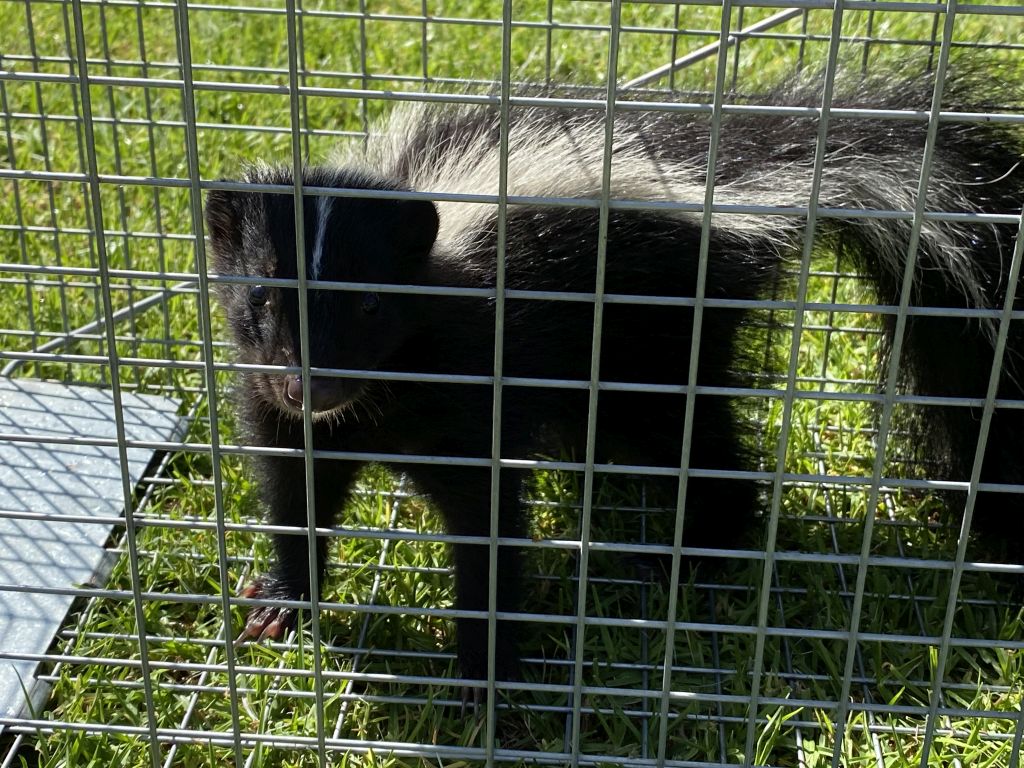
How to Remove Skunks From Under A Porch?
At C&C Wildlife Control, we’ve got plenty of experience removing all sorts of wild animals from human properties. So we figured it’s only fair that we share some of the tips and tricks we’ve picked up over the years.
We have a fair bit of experience working with skunks, in and around properties. So in this article, we’ll talk about what you need to do, if you’re dealing with a skunk stuck underneath your porch.
First, what’s the deal with skunks?
We’re all familiar with the black and white critters, but are skunks as dangerous as they seem? Skunks aren’t really used to attack, since they rarely have to fight (the stench prevents that). However, the spray they release, if they feel attacked or cornered, is pretty potent. So you’ll want to keep away and keep your family and pets away, also.
You’ll also want to remove the skunks as swiftly as possible, as their presence exposes you to all sorts of serious diseases.
How do you get rid of a skunk under the porch?
Use smell.
It’s perhaps a little ironic that skunks are very sensitive to strong smells, which is why a popular DIY remedy involves soaking a couple of rags in ammonia and stuffing them underneath the deck, in the skunk’s crawling space.
We suggest wearing adequate protection (like rubber gloves) to protect yourself against a potential attack.
Alternatively, you could use apple cider vinegar, also known for its strong scent. It might be a good idea to stuff the rag inside a plastic bag, and tear a hole in it, to keep the fumes in and the scent more potent. It’s probable that the skunk(s) will mistake this for the smell of predator urine, and run.
Install a one-way door.
This method is known as exclusion and can work really well in getting rid of unwanted wildlife. This is how you do it – you identify the entry point to the crawling space underneath your deck or porch. Next, you buy a one-way skunk exclusion door from a specialty store, and install it directly over the entryway. This way, any skunks residing underneath will be shut out the next time they venture out to look for food.
You could just give it some time.
Summer is the designated season for skunks invading human properties for one simple reason – its baby-raising season. Yes, it’s quite likely that what you’ve got underneath the porch isn’t one skunk, but rather a mother raising her young. And we really don’t recommend attempting to harm them, since you’d also be dealing with strong maternal instincts, on top of a skunk’s natural self-preservation.
So it’s a popular option to just wait it out. Usually, the mother skunk will use your crawl space as a nesting spot for the summer, until her babies are grown up and can survive on their own. After the babies are grown (which is usually around the end of summer), they will all naturally leave.
Call a professional.
There’s always the option to call a professional wildlife removal company. While this is considered a pricier option by many, calling a wildlife removal company as C&C Wildlife Control gives you a bunch of benefits:
- Guaranteed skunk removal;
- Identification of possible attraction points;
- Tips to prevent any future skunk invasions;
- Repairing the entry space, and possibly even the damage caused by the skunk(s) – though this will vary from one removal company to another.
All in all, there are a bunch of ways to get rid of skunks under your porch!
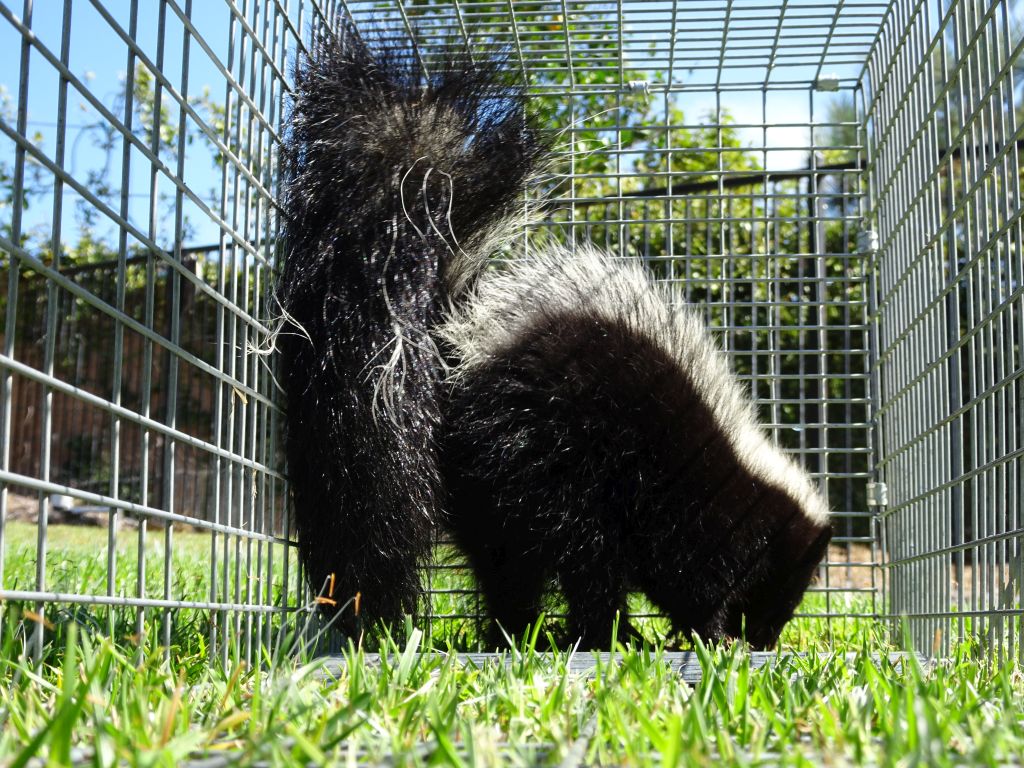
How to Know You Have a Skunk Living in Your Basement
Among the many things you hope to wake up to everything, none of it should be the smell of a skunk. If it already smells like one, you may be in mild trouble. Skunks are very mobile critters, always on the move for improved resources and shelter. And your basements make for good skunk shelter and escape from predators.
You will always know if you have a Skunk problem. Many pointers reveal what skunks are present in the basement, attic, shed, or any other parts of the building. This includes the following;
- Unpleasant smell
When skunks enter your building, the common signal is the unpleasant odor they carry along with them. Also, Skunk sprays can reach a longer range target and smell for a longer period of days. In addition to smells you cannot locate, you may also perceive such unpleasant odors on Pets and other things around the house.
If your basement contains some tools or other equipment, and they stink, a Skunk must be around. Skunk smells are usually deep and offensive and may cost a lot to remove/clean off.
- Paw-marks and Tracks
Paw marks are very telling, especially on marshy, soft grounds. Since skunks forage at night, it may be hard to get them. But the paw prints they live on the soil or other clear surfaces are good proof of their presence.
Skunks have unique paw prints when compared to other similar animals. Although judging by the paw prints alone, it may be difficult to address a Skunk correctly, they are distinctive for the keen observer.
- Droppings and Wastes
Critters cannot do without dropping their waste as they forage about. Skunk droppings are likely common in areas where they build their colony. If a skunk has infested your basement, you will find heavy droppings in the basement and around other entrances.
Also, large animal droppings begin to give a distinct and unpleasant smell.
- Holes and other little excavations
Skunks are ferocious feeders and will usually dig as much as 4 inches under the ground to pick up any food. They dig a hole in the complete shape of a half-moon with visible depressions. The holes they make are similar to those of a raccoon, and it is such actions that make them really dangerous to gardens, lawns, and farmlands.
- Sightings
Of course, the grandest proof, but the least expected occurrence is that you can see them scampering about your property. Although Skunk primarily operates at night, it is still possible that there may be some reckless or even “diseased” ones running about during the day.
It is also possible that you accidentally come across a stray skunk in the early mornings or the late evenings. However, such confrontations often lead to the human getting Skunk sprayed.
What attracts Skunks to my basements?
Like many other animals and critters, the quest for food, security, and shelter supersedes all other needs. The basement offers a dark, unused, and safe place for Skunks to operate from, especially when close to a food source.
Skunks are wild in their diets and will eat almost anything, including;
- Birdseed,
- Ground worms,
- Grubs,
- Berries,
- Corn,
- And other insects.
If your property has an abundance of these foods, the best expect a skunk to visit and possibly live with you soon.
How do you know a skunk?
Skunks are generally avoided for the generous sprays they discharge when confronted. They are sized like a domestic cats, with white stripes on their black fur.
Trapping or dealing with skunks can be very complicated; you can contact our services for a resolution.
How to Keep Skunks out of Your Garden
While most people associate skunks with their foul odor, there are many problems that skunks can cause if they get onto your property. Skunks can be a very damaging nuisance animal, particularly if you have a vegetable or flower garden. Their biological habits and traits tend to lead to wide-ranging problems for homeowners. Continue reading to learn how you can keep skunks out of your garden.
Make Your Property Less Appealing
One of the easiest ways to keep skunks out of your garden is to make your property not worth a skunk’s time to visit. A particularly simple way to do this is to think about all of the different easy food sources and shelter around your property. Once you have come up with a list of these, you can start fixing all of the problems. For example, one easy fix for most yards is to keep grass and weeds cut short. Other fixes can be picking up debris piles, cleaning up any fallen fruit or vegetables, and locking up the trash and any pet food you might be leaving out all day. By limiting food access and shelter access, you will already make it much less likely that a passing skunk will make its way to your yard, and then to your garden.
Secure Your Garden
Another way to keep skunks out of your garden is to install a fence around your garden. If you have a very large garden or multiple gardens, this tip might not be as feasible, but it should be very effective for those who do it. Putting up a chicken wire fence around your garden’s perimeter can keep skunks and many other pests out very effectively. Though a skunk could dig underneath, this would likely require too much effort for them. If you want to really secure your garden from squirrels and birds as well, consider layering the top of the fence with chicken wire as well. This multi-species barrier should keep your garden safe from all but the most determined critters.
Build a Fence
The last tip was about building a fence around your garden. This tip is all about building a fence around your property. For many people with large yards, the financial outlay may be so significant that you do not want to tackle this project. However, for anyone who does want to build a fence, it can serve several benefits. One of the most important is keeping out virtually every nuisance animal there is. Only birds, squirrels, and other climbing animals could gain access. There are even some fencing options that extend underground in order to keep burrowing animals out! Another benefit of a fence is that it can allow your pets to roam freely if they do not normally, which also serves another purpose for keeping pests away! If you let dogs roam around your garden, they will keep all pests away simply by being a threat to the animals.
Hire a Professional
One of the most surefire ways to keep skunks out of your garden is to hire a professional wildlife removal service. Even if the skunk does not seem to be living on your property, wildlife removal professionals will be able to set traps around your garden. In addition, these experts can offer suggestions and solutions in order to reduce the attractiveness of your yard, remove the threat of nuisance animals getting into your home or other buildings, and they can even perform prevention services to pest-proof your home further. You can rest assured that once a wildlife removal professional has performed their work, there will be no more skunks destroying your garden!
